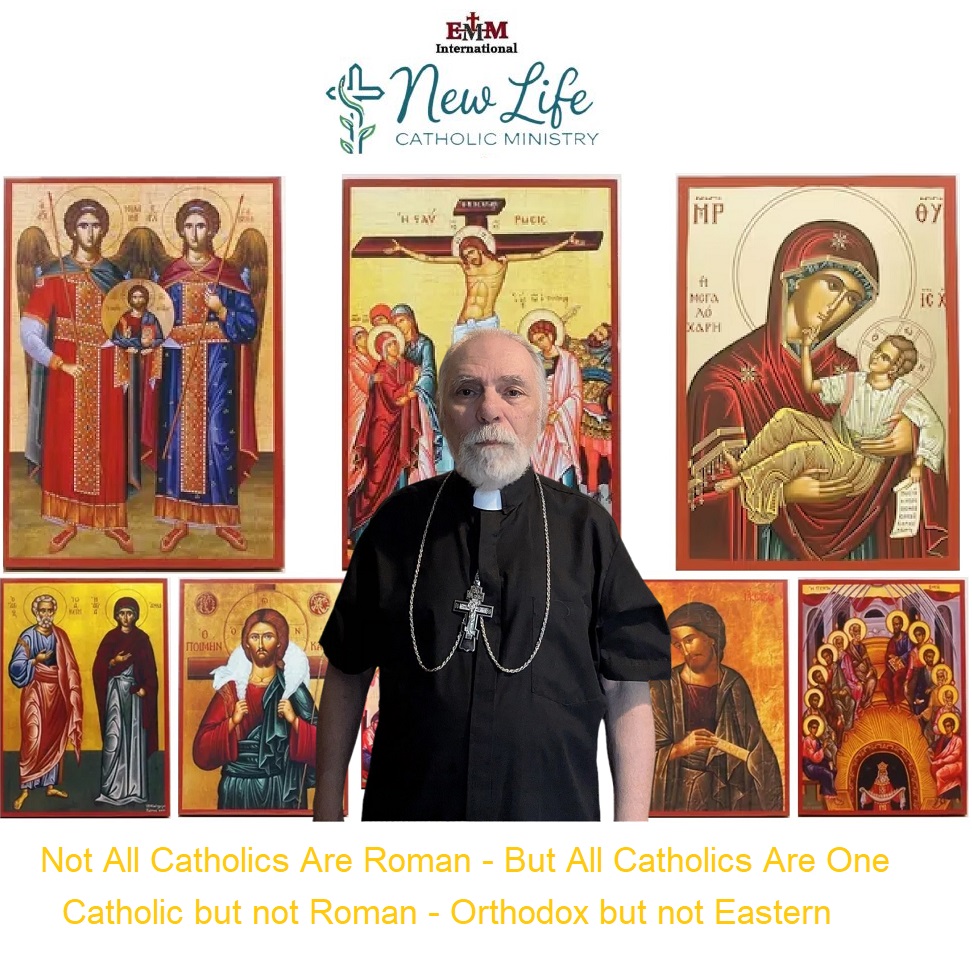
Not All Catholics Are Roman – But All Catholics Are One
Eric Michel Ministries International is a New Life Catholic, as we are Catholic but not Roman, and we are Orthodox but not Eastern Orthodox.
We bear solemn witness to the One, Holy, Catholic and Apostolic, grounded in the undivided faith of the primitive Church and continuing in obedience to the Gospel of Christ.
We are Catholic, but not Roman, faithful to the Universal Church and Apostolic Traditions, without submission to the Pope, yet working together as missionaries of the Good News.
We are Orthodox, but not Eastern Orthodox, preserving the fullness of the Anglican Rites in the Western expression of Orthodoxy.
Christ is the center and head of our Ministry. We proclaim Jesus as the Universal Christ, the sole foundation of our faith and the unifying source of our ecclesial identity.
Our Mission:
To follow Jesus Christ in the footsteps of Francis of Assisi, Benedict of Nursia and Thomas Aquinas. And be consecrated to Holy Mary.
“New Life Catholic” refers to the foundational Catholic teaching that, through the grace of God and sacraments, believers are reborn into a new spiritual existence, leaving behind old ways of living to pursue a deeper relationship with Jesus Christ and a life of holiness. This “new life” involves a profound union with Christ, enabling believers to live by faith, receive spiritual nourishment, and embrace God’s mission to bring His renewal to the world.
Key Aspects of New Life in Christ:
Baptism and Union with Christ: The Catholic understanding of a new life in Christ begins with baptism, a sacred act that symbolizes a rising to new life with Christ. Through baptism, believers are clothed with Christ and become one with Him in a profound union.
Transformation of Life: This new life requires a transformation of one’s thinking, habits, and expectations, letting go of old ways of living to embrace new ones rooted in Christ’s teachings, as well as those of Marianist & Teilhardist traditions.
Spiritual Nourishment: The Eucharist (Holy Communion) provides “true food” for this new spiritual life, sustaining believers in their union with Christ.
Mission and Holiness: Living this new life involves participating in God’s mission to proclaim the Gospel and renew the world. It also means growing in holiness through the Catholic teachings, its codes of conduct, and its sacraments.
Continual Renewal: The journey of new life is a process of continuous renewal, not just a single event. God continually provides for and renews His people through various encounters, especially in the sacramental life of the Church.
Empowerment by the Holy Spirit: The Holy Spirit, received as a born-again Charismatic Confirmation, empowers believers for this journey of faith and service.
In essence, “New Life Catholic” signifies a complete spiritual rebirth that leads to a profound, ongoing relationship with God, transforming believers to live in a way that reflects the love and teachings of the Universal Christ.
“We are New Life Catholic” is a spiritual declaration referring to individuals or groups that have embraced a renewed life through faith. The phrase draws on the core Christian belief that through baptism and a relationship with Jesus Christ, one becomes a “reborn” person, a born-again Christian Catholic.
As a spiritual declaration, it can be understood in several ways:
A New Beginning through Sacraments: In the Catholic tradition, the sacraments of Baptism and Confirmation are viewed as transformative events. The phrase can serve as a way to celebrate this spiritual renewal.
A call to conversion: Can signify a personal commitment to living a life aligned with the Catholic teachings of Pierre Teilhard de Chardin, explained by Ilia Dilo, a Franciscan nun. This involves a change of heart and mind, as well as striving for virtue.
An Easter and Resurrection message: The concept is a central theme during the Easter season, which celebrates the resurrection of Jesus and his victory over death. By rising with Christ, Catholics are called to a new existence.
In contrast to other Christian groups, while some non-Catholic churches named “New Life” exist (often evangelical or Pentecostal), the addition of “Catholic” signals adherence to the traditions and doctrine of the Roman Catholic Church.
